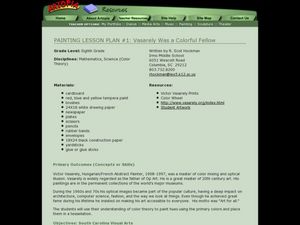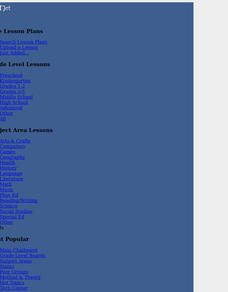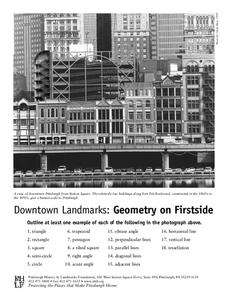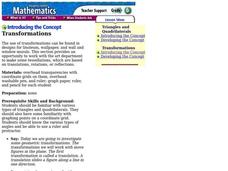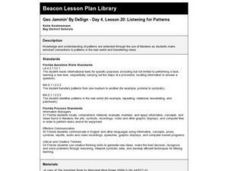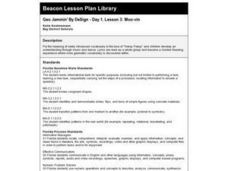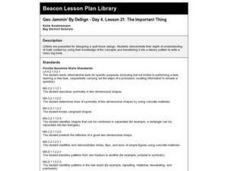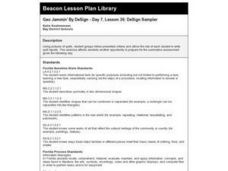Virginia Department of Education
Rotation
Rotate this resource into your lesson plans. Scholars rotate polygons in the coordinate plane by multiples of 90 degrees. They then compare the original and new figures to develop conjectures about coordinate points after rotations.
Curated OER
Integrating Art Into Other Content Areas
Here are some ideas to help add an art lesson to every math, science, social studies, or language arts unit.
Curated OER
Vasarely Was A Colorful Fellow
Eighth graders create artwork inspired by the work of Victor Vasarely. In this op art lesson, 8th graders explore color theory and color mixing. Students create ten shapes to use in their artwork and over the course of two weeks,...
Curated OER
School of Fish
Student explore the natural resources of Buffalo National River. In this natural resources instructional activity ,students discuss the fish and other animals in the Buffalo River. Students discuss what they can do to keep the river...
Curated OER
Batlik- Art of Japan
Eighth graders will examine the use of Japanese ar tforms. The paper lantern is the example drawn from for learners to connect with the culture. The end result is a creative project that should reflect the culture of Japan.
Curated OER
Cracker Design
Students are presented with the following problem: A cracker manufacturer has been losing money and has to find a way to save her factory. They are given the task to design a new shape for the cracker manufacturer so that as little...
Curated OER
Patterns: A Stitch in Time
Learners recognize shapes, designs and numbers that form patterns. Using their surroundings, they identify common patterns. They create their own patterns in various software programs and share them with the class.
Curated OER
Lesson Exchange: Polygons (Middle, Mathematics)
Learners discover the relationship between the sides of a polygon and the number of diagonals that can be drawn from one vertex, the number of triangles that those diagonals form, and the sum of the interior angles of that polygon.
Curated OER
Easy and Artistic Printmaking Using Mixed Media Materials
Pupils explore printmaking which began with the ancient Chinese who carved seals from stone, inked them and used the seals as identification symbols. They produce a print in this lesson plan.
Curated OER
Area of Combined Shapes - Turtle Combo
Students graph polygons using the name and number of sides. For this geometry lesson, students identify the formula to calculate the area and perimeter of polygons. They relate the formula to different polygons and shapes.
Curated OER
Geo Jammin' By DeSign - Day 3, Lesson 15: The Quiltmaker's Gift
Students listen to a read aloud of The Quiltmaker's Gift by Jeff Brumbeau finding examples of symmetry in the illustrations in the book.
Curated OER
Mathematics of Ornaments and Architecture
Students study African traditional architecture. They examine how African ornaments, wall painting and motifs use geometric shapes to express and explain the culture.
They discuss the ornaments and architectural designs in the setting...
Curated OER
Downtown Landmarks: geometry on Firstside
In this geometry worksheet, students look at a picture of downtown landmarks and identify different shapes, lines, and more. Students identify 18 items.
Curated OER
Transformations
Learners draw on graph paper. In this geometry lesson, students review types of triangles and quadrilaterals. Learners investigate geometric transformations, including translation, rotation and reflection. Students practice each...
Curated OER
Incorporate Black History into Math
February is Black History Month. So why not highlight lessons that connect mathematics to Africans and African Americans?
Curated OER
Using the Variation Approach
Learners explore and explain geometrical applications, and how to apply these applications to real life.
Curated OER
Geo Jammin' By Design: Listening for Patterns
Students listen to the teacher read a book and participate with guided questions. They discuss patterns and how they repeat, by looking at quilts. They design their own quilt block to create a class quilt.
Curated OER
Geo Jammin' By DeSign - Day 1, Lesson 3: Moo-vin
Second graders practice new geometry vocabulary by putting the words to the tune of "Hokey Pokey." students use the lyrics as a guided reading experience.
Curated OER
Geo Jammin By Design: The Important Thing
Students brainstorm what they know about geometric terms and patterns. They identify symmetry, shapes and congruency. They create a book of symmetry.
Curated OER
Geo Jammin' By DeSign - Day 5, Lesson 28: The Mo-tea-if
Second graders explore tea dyeing cloth.
Curated OER
Geo Jammin' By DeSign - Day 6, Lesson 32: Appliqué-tion of Learning
Second graders hand stitch three different appliqué stitches using triangles as a motif.
Curated OER
Flying Geese
Pupils examine the Flying Geese quilt pattern, and discuss and identify the pattern. They write a paragraph titled, My Quilt Report, summarizing the information discussed about the quilt patterns.
Curated OER
Geo Jammin' By DeSign - Day 7, Lesson 36: DeSign Sampler
Second graders, in groups, write quilt reports.
Curated OER
The Clumsy Tiler S
Fourth graders solve a series of parallel problems. They use statistics, geometrical, and numerical aspects to solve the problem. Students create a pattern that answers the problem.




